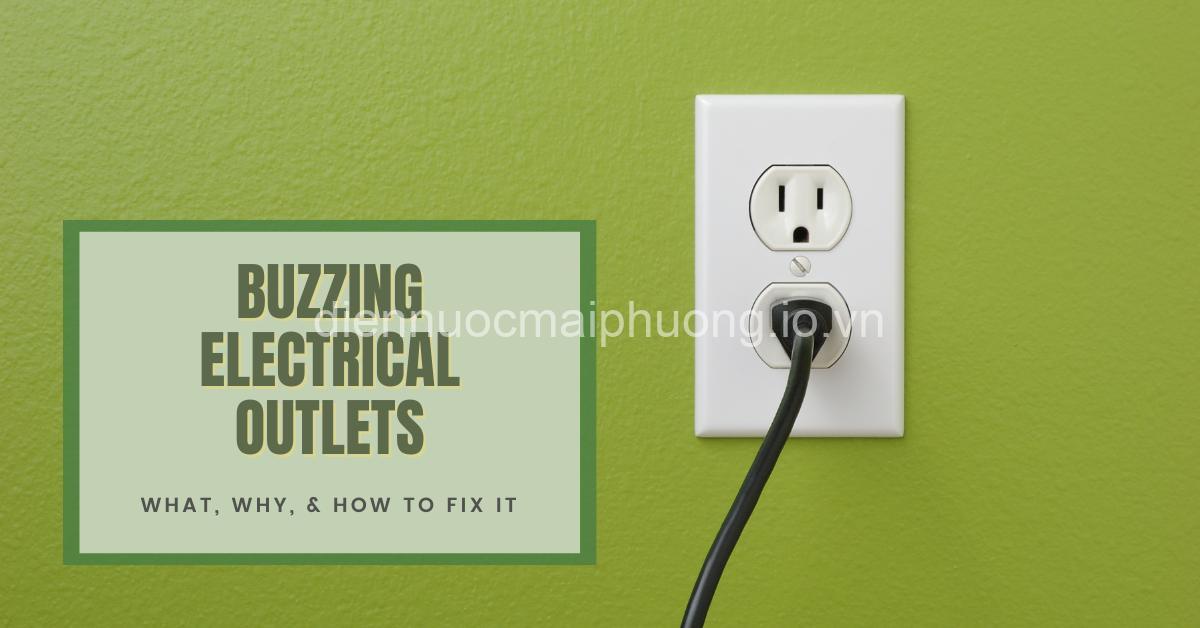Electrical Knowledge
Electrical Hums & Buzzes: Troubleshooting Guide – diennuocmaiphuong.io.vn
Electrical Hums & Buzzes: Troubleshooting Guide – diennuocmaiphuong.io.vn. In today’s article, diennuocmaiphuong.io.vn will explore with you in the most detailed and complete way. See now!
Common Causes of Electrical Hums and Buzzes
Electrical noise, like humming and buzzing, can be a frustrating and sometimes alarming issue. It’s important to address these problems promptly, not only for comfort but also for safety. Let’s explore the most common causes of electrical noise:
Loose Connections: One of the most frequent culprits is a loose connection. When wires aren’t securely connected, they can create arcing, leading to a buzzing sound. This can happen in outlets, switches, appliances, and even your home’s wiring. A quick inspection and tightening of connections can often resolve the issue.
Overloaded Circuits: Another common cause is an overloaded circuit. When too many appliances are plugged into a single circuit, the wires can overheat and create a humming sound. This can be dangerous, so it’s essential to identify and address overloaded circuits. A warm outlet or flickering lights can be signs of an overloaded circuit. Use multiple outlets or extension cords cautiously and ensure you’re not exceeding the circuit’s capacity.
Faulty Appliances: A faulty appliance can also be the source of electrical noise. Defective motors, transformers, or other components in appliances can create humming or buzzing sounds. This can happen with refrigerators, washing machines, air conditioners, and more. To isolate a faulty appliance, try unplugging it to see if the noise disappears. If it does, it’s time to consider a repair or replacement.
Interference from External Sources: Electrical noise can be transmitted through the air, and sometimes it’s not even coming from your home. Fluorescent lights, electrical motors, and even power lines can emit electrical noise that can be picked up by other equipment in your home. This interference can cause a variety of sounds, including humming, buzzing, and clicking.
Grounding Issues: Proper grounding is essential for safety and to minimize electrical noise. An improperly grounded circuit can result in a humming sound. Make sure all appliances and outlets in your home are properly grounded. If you’re unsure about your grounding, consult a qualified electrician.

Identifying the Source of the Hum or Buzz
To troubleshoot electrical noise effectively, you need to identify the source. Let’s break down the process:
Location: First, try to determine the general location of the noise. Listen carefully and try to pinpoint the area where the sound is strongest. Sometimes, you can follow the sound to its source. You might find that the noise is coming from a particular appliance, a specific outlet, or even a section of your wiring.
Frequency: Next, pay attention to the frequency of the noise. Is it a constant, low-frequency humming or a high-frequency buzzing? Or, is it a series of quick, sharp clicks? The type of noise can provide clues about the potential cause.
Volume: The volume of the noise can also be helpful. A louder noise might indicate a more serious issue, such as a loose connection that’s about to fail. A quiet noise might be less worrisome, but it’s still important to investigate.
Changes in Noise: Finally, pay attention to how the noise changes. Does it change when you turn on or off appliances, or when you use other electrical devices? This can help you narrow down the possible causes.
Troubleshooting Steps
Once you’ve identified the source of the noise, you can start troubleshooting. Here’s a step-by-step guide:
Safety First: Always prioritize safety when dealing with electrical issues. Before you start troubleshooting, disconnect power to the affected area. This means turning off the circuit breaker or unplugging the appliance. Never work with live electrical components.
Visual Inspection: Once the power is off, perform a visual inspection of the affected area. Look for any signs of damage, such as loose wires, frayed insulation, or burn marks. These signs can point to the root cause of the electrical noise.
Check Connections: Inspect all electrical connections, including outlets, switches, and appliance cords. Tighten any loose connections. You might need a screwdriver or other tools to do this. Make sure that all connections are secure and free of corrosion.
Test Appliances: If the noise seems to be coming from a specific appliance, try unplugging it to see if the noise disappears. If it does, the problem is likely with the appliance itself. You might need to repair or replace the appliance.
Check Circuit Breakers: Inspect your circuit breakers to make sure they are not tripped. If a circuit breaker has tripped, it means the circuit is overloaded. Reset the circuit breaker and try to avoid overloading the circuit in the future.
Inspect Grounding: Make sure all appliances and outlets are properly grounded. A good grounding system is essential for safety and can help minimize electrical noise. You can check the grounding by using a multimeter or consulting with a qualified electrician.
When to Call a Professional: If you’re unsure about the source of the electrical noise or how to fix it, it’s best to call a qualified electrician. They can assess the situation, identify the problem, and make the necessary repairs.
Preventing Future Electrical Noise Issues
You can take steps to prevent electrical noise from recurring:
Regular Maintenance: Perform regular maintenance checks on your electrical system. This includes inspecting wiring, outlets, and appliances for any signs of wear or damage. Tighten loose connections, replace worn-out cords, and ensure that all components are in good working order.
Use Surge Protectors: Surge protectors help protect appliances from power surges and spikes, which can damage electronic components and cause electrical noise. Plug your sensitive electronics into a surge protector to reduce the risk of damage.
Avoid Overloading Circuits: Be careful about the number of appliances you plug into a single circuit. Try to spread the load across multiple circuits to avoid overloading. Use extension cords judiciously, and never plug multiple high-wattage appliances into the same outlet.
Frequently Asked Questions
What should I do if I hear a humming noise coming from my refrigerator?
If you hear a humming noise from your refrigerator, it could be due to a faulty compressor motor, a loose connection, or a malfunctioning fan. Check the connections, inspect the compressor motor for signs of wear, and ensure the fan is running smoothly. If the noise persists, it’s best to call a technician for a professional diagnosis.
My wall outlet is buzzing. What’s the problem?
A buzzing wall outlet could indicate a loose connection, a faulty outlet, or an overloaded circuit. First, check the connections to the outlet and tighten them if necessary. If the noise persists, consider replacing the outlet entirely. If the circuit is overloaded, consider using a different outlet or reducing the load on the circuit.
My computer is making a buzzing noise. What’s going on?
A buzzing computer could be caused by faulty components, a loose connection, or electromagnetic interference (EMI). Check the connections inside the computer, and ensure all components are properly seated. If you suspect EMI, try moving the computer away from other electronic devices or sources of interference.
Why is my washing machine humming loudly?
A humming washing machine could be due to a worn-out motor, a faulty belt, or an imbalance in the drum. Inspect the motor and belt for signs of wear, and ensure the drum is properly balanced. If the noise persists, consult a technician.
My television is making a buzzing sound. What could it be?
A buzzing television could be caused by faulty components, a loose connection, or interference from nearby devices. Inspect the connections, check for signs of damage to the components, and try moving the television away from other electronic devices to reduce interference.
Conclusion
Electrical noise can be a nuisance, but it’s important to address the problem promptly. By understanding the common causes, following troubleshooting steps, and practicing preventative measures, you can keep your home safe and quiet.
If you have any further questions, leave a comment below, share this article with your friends, or visit our website for more informative articles on electricity and water: https://diennuocmaiphuong.io.vn
- Jessica David Rodriguez, Owner, diennuocmaiphuong.io.vn
EAVs:
- Appliance | Type | Refrigerator
- Electrical Noise | Source | Transformer
- Wiring | Condition | Loose
- Connection | Type | Ground
- Circuit | Load | Overloaded
- Appliance | Brand | Whirlpool
- Electrical Noise | Frequency | 60 Hz
- Noise | Volume | Loud
- Wiring | Material | Copper
- Connection | Location | Outlet
- Circuit Breaker | Status | Tripped
- Appliance | Age | 10 years
- Electrical Noise | Duration | Constant
- Wiring | Installation | Improper
- Connection | Quality | Poor
- Circuit | Amperage | 15 Amp
- Appliance | Usage | Frequent
- Electrical Noise | Pattern | Intermittent
- Wiring | Damage | Insulation
- Connection | Tightness | Loose
ERE:
- Appliance (Refrigerator) | Connected To | Circuit (Kitchen)
- Circuit (Living Room) | Powered By | Power Source (Main Panel)
- Electrical Noise | Originates From | Faulty Component (Motor)
- Wiring (Outlet) | Connected To | Appliance (TV)
- Connection (Ground) | Prevents | Electrical Shock
- Appliance (Washing Machine) | Located In | Room (Laundry)
- Electrical Noise | Caused By | Overloading (Circuit)
- Circuit Breaker (Main) | Protects | Electrical System
- Wiring (House) | Installed By | Electrician
- Electrical Noise | Measured With | Multimeter
- Appliance (Microwave) | Uses | Power (120V)
- Connection (Loose) | Creates | Electrical Arcing
- Circuit (Bathroom) | Restricted To | Low-Voltage Devices
- Wiring (Ground) | Connects To | Ground Rod
- Electrical Noise | Interrupts | Electronic Devices
- Appliance (Computer) | Emits | Electromagnetic Interference (EMI)
- Circuit (Overloaded) | Causes | Overheating
- Wiring (Damaged) | Poses | Safety Hazard
- Connection (Poor) | Leads To | Electrical Fire
- Circuit (Grounded) | Reduces | Risk Of Shock
Semantic Triples:
- Refrigerator | is a type of | Appliance
- Transformer | is a source of | Electrical Hum
- Loose Connection | can cause | Electrical Buzz
- Grounding | prevents | Electrical Shock
- Overloaded Circuit | can lead to | Electrical Noise
- Appliance | is powered by | Electrical Circuit
- Wiring | connects | Electrical Components
- Motor | can be a source of | Humming Noise
- Circuit Breaker | protects | Electrical System
- Multimeter | is used for | Measuring Electrical Noise
- Electrical Noise | can be caused by | Faulty Component
- Electrical Noise | can be reduced by | Proper Grounding
- Electrical Noise | can interfere with | Electronic Devices
- Electrical Safety | is important for | Preventing Accidents
- DIY Projects | can involve | Electrical Troubleshooting
- Electrical Inspection | ensures | Safe Electrical System
- Electrician | is a professional who | Repairs Electrical Problems
- Power Tools | may produce | Electrical Noise
- Home Improvement | may involve | Electrical Work
- Building Codes | regulate | Electrical Installations
